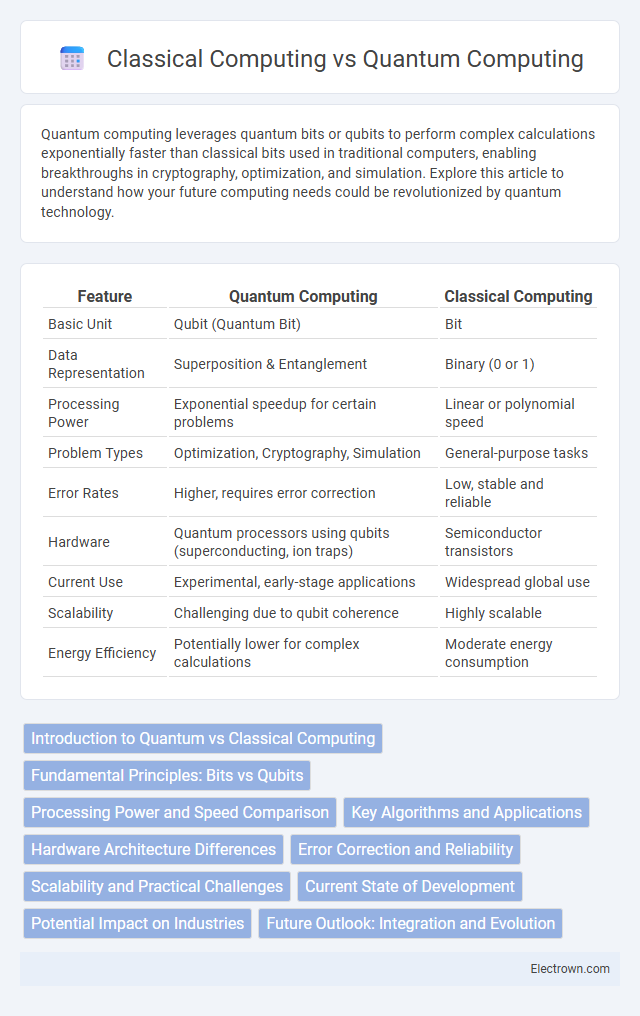Quantum computing leverages quantum bits or qubits to perform complex calculations exponentially faster than classical bits used in traditional computers, enabling breakthroughs in cryptography, optimization, and simulation. Explore this article to understand how your future computing needs could be revolutionized by quantum technology.
Table of Comparison
| Feature | Quantum Computing | Classical Computing |
|---|---|---|
| Basic Unit | Qubit (Quantum Bit) | Bit |
| Data Representation | Superposition & Entanglement | Binary (0 or 1) |
| Processing Power | Exponential speedup for certain problems | Linear or polynomial speed |
| Problem Types | Optimization, Cryptography, Simulation | General-purpose tasks |
| Error Rates | Higher, requires error correction | Low, stable and reliable |
| Hardware | Quantum processors using qubits (superconducting, ion traps) | Semiconductor transistors |
| Current Use | Experimental, early-stage applications | Widespread global use |
| Scalability | Challenging due to qubit coherence | Highly scalable |
| Energy Efficiency | Potentially lower for complex calculations | Moderate energy consumption |
Introduction to Quantum vs Classical Computing
Quantum computing leverages qubits that can exist in superposition, enabling parallel processing of complex computations far beyond the capabilities of classical bits limited to binary states. Classical computing relies on deterministic binary logic and sequential processing, making it efficient for standard tasks but slower for certain algorithms like factoring large numbers or simulating quantum systems. Understanding the fundamental differences between quantum and classical computing can help you appreciate the potential breakthroughs in cryptography, optimization, and artificial intelligence brought by quantum technologies.
Fundamental Principles: Bits vs Qubits
Classical computing relies on bits as fundamental units of information, representing data as either 0 or 1, enabling straightforward binary operations. Quantum computing uses qubits, which exploit superposition to exist in multiple states simultaneously, vastly increasing computational power for certain tasks. Your understanding of bits versus qubits highlights how quantum systems can perform complex calculations more efficiently than classical computers, especially in processing large-scale data and solving optimization problems.
Processing Power and Speed Comparison
Quantum computing leverages qubits and quantum superposition to perform certain calculations exponentially faster than classical bits in traditional computing. Your computational tasks involving complex simulations, cryptographic analysis, or optimization problems experience significant acceleration due to quantum parallelism, which classical processors cannot match. Classical computing, based on binary logic, remains efficient for everyday applications but falls short in handling massive datasets and complex problem-solving at the speed quantum processors potentially offer.
Key Algorithms and Applications
Quantum computing leverages key algorithms such as Shor's algorithm for factoring large numbers exponentially faster and Grover's algorithm for unstructured database search, enabling breakthroughs in cryptography and optimization problems. Classical computing relies heavily on well-established algorithms like Dijkstra's for shortest path and QuickSort for efficient data sorting, maintaining dominance in everyday applications and large-scale data processing. Your choice between quantum and classical computing depends on the specific computational problem, with quantum algorithms offering transformative potential for complex, specialized tasks beyond classical capabilities.
Hardware Architecture Differences
Quantum computing hardware relies on qubits, which utilize superposition and entanglement to perform complex calculations simultaneously, whereas classical computing uses bits operating in binary states of 0s and 1s. The physical architecture of quantum computers involves delicate components such as superconducting circuits or trapped ions maintained at near absolute zero temperatures, contrasting with classical computers that use silicon-based transistors in integrated circuits. Your computing power in quantum systems depends heavily on quantum coherence and error correction, factors less critical in the robust and mature hardware design of classical machines.
Error Correction and Reliability
Quantum computing utilizes quantum error correction codes like surface codes to address qubit decoherence and gate errors, enhancing overall system reliability despite the fragile nature of quantum states. Classical computing relies on well-established error detection and correction methods such as parity checks and ECC memory, ensuring high reliability in data processing. Your choice between quantum and classical systems depends on balancing quantum error correction challenges with the proven stability of classical computing architectures.
Scalability and Practical Challenges
Quantum computing offers unparalleled scalability potential by leveraging qubits that can represent multiple states simultaneously, vastly surpassing classical bits' binary limitations. However, maintaining qubit coherence and error rates poses significant practical challenges in building large-scale quantum systems. Your ability to harness these emerging technologies depends on overcoming stability issues and developing efficient quantum error correction methods.
Current State of Development
Quantum computing remains in the experimental stage with ongoing advancements in qubit stability, error correction, and scalable architectures, whereas classical computing continues to evolve through increased transistor density and improved processing speeds. Researchers are developing prototype quantum processors capable of solving specific problems more efficiently than classical computers but widespread practical applications are still limited. Your future technology choices may depend on how quickly quantum computing matures beyond its current infancy to complement or surpass traditional computational methods.
Potential Impact on Industries
Quantum computing promises to revolutionize industries such as pharmaceuticals, logistics, and finance by enabling complex molecular simulations, optimization problems, and risk assessments far beyond the reach of classical computers. Classical computing continues to drive everyday applications and large-scale data processing, but it struggles with solving certain problems involving vast combinatorial possibilities. As quantum hardware matures, sectors like cryptography, materials science, and artificial intelligence could experience unprecedented advancements due to exponential speedups in computation.
Future Outlook: Integration and Evolution
Quantum computing's future outlook emphasizes seamless integration with classical computing systems, creating hybrid architectures that exploit quantum speedups for complex problem-solving while maintaining classical reliability for everyday tasks. Advancements in quantum algorithms and error correction are accelerating the evolution of quantum processors, aiming to overcome current scalability challenges. Research ecosystems and industry collaborations are driving innovations that anticipate quantum technology becoming an integral component of cloud services and high-performance computing platforms within the next decade.
Quantum Computing vs Classical Computing Infographic

 electrown.com
electrown.com